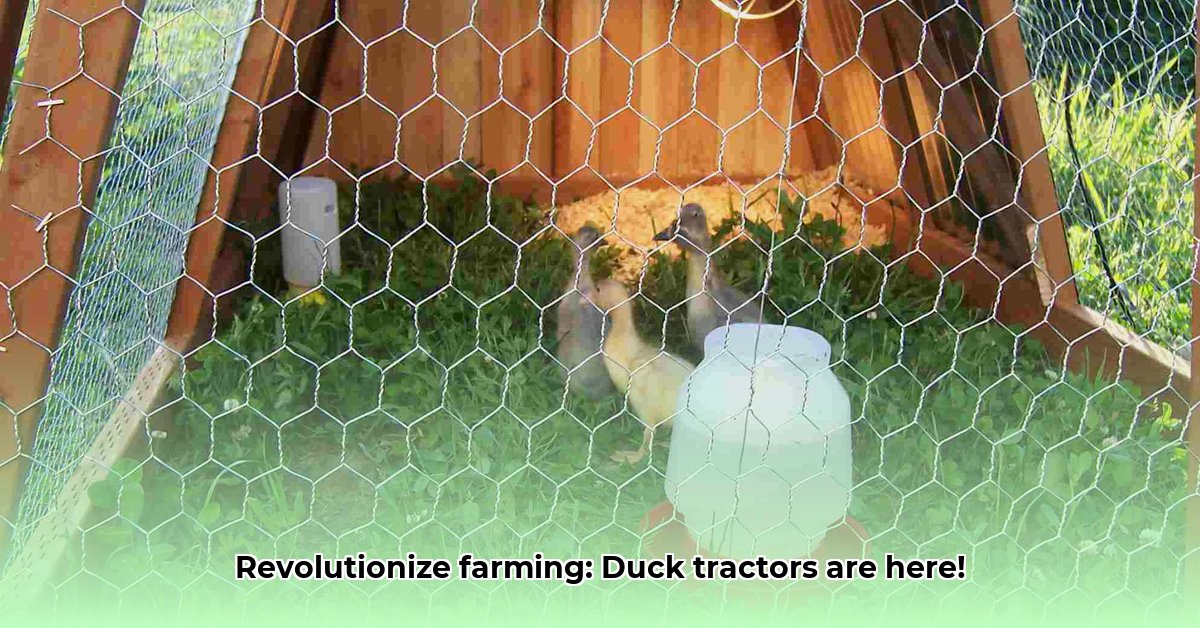
Duck Tractor: Sustainable Farming on Wheels
Duck tractors aren't some fantastical machine pulling ducks down the road; they're mobile duck houses designed for sustainable farming. This innovative system allows ducks to graze and naturally fertilize land, creating a healthier environment and potentially boosting farm profitability. This guide explains how to build and utilize duck tractors, offering expert advice and real-world examples to help you succeed, whether you're a seasoned farmer or just starting out. For visual inspiration, check out these chicken tractor images.
Understanding the Duck Tractor Concept
A duck tractor is a portable housing unit for ducks, moved periodically across your land to allow grazing in different areas. Their droppings serve as natural fertilizer, enriching the soil. This mimics natural waterfowl grazing, promoting a healthier ecosystem and potentially improving farm finances. Isn't that a win-win scenario?
Designing Your Duck Tractor: A Customizable Approach
Building your own duck tractor allows customization to suit your needs and budget. Key considerations include:
Mobility: How will you move it? Simple wheels, a small trailer? This impacts design and costs. A heavier design needs a more robust moving system, while a lighter one is easier to manage but less durable.
Size: The number of ducks dictates the size. Overcrowding causes stress and makes cleaning difficult. Consider your breed's size and growth rate. How many ducks do you plan to house? What breed are you using?
Predator Defense: Strong fencing and sturdy construction are vital to protect against predators. The level of protection depends on your local wildlife. What are the most common predators in your area?
Weather Protection: A roof and side walls offer protection from the elements. Proper ventilation prevents harmful gas buildup. What are the temperature extremes in your region?
Cleanliness: Easy-to-clean surfaces are essential for disease prevention. Design it for efficient waste removal. What cleaning methods are you most comfortable with?
Choosing Your Materials: Sustainable Choices
Using sustainable and readily available materials minimizes costs and environmental impact. Options include:
Recycled Wood: Repurposed pallets or reclaimed lumber are affordable and environmentally friendly. Ensure proper treatment for weather resistance.
Metal: Metal offers durability and longevity; however, the initial investment is higher. Consider galvanized steel or corrosion-resistant alternatives.
Hay Bales: Hay bales are a surprisingly effective, economical temporary solution for smaller flocks or short-term use. Remember, structural integrity is less long-lasting compared to wood or metal.
Weighing the Pros and Cons: Is a Duck Tractor Right for You?
Before investing, consider advantages and disadvantages:
| Advantages | Disadvantages |
|---|---|
| Reduces need for chemical fertilizers | Requires initial investment |
| Provides natural pest control | Needs regular relocation and management |
| Improves pasture health and soil fertility | May not suit all terrains and climates |
| Enhances duck health | Potential for pasture damage if overgrazed |
| Minimizes negative environmental impacts | Requires dedicated space and ongoing attention |
| Can increase profitability | Requires DIY skills or contractor costs |
Implementing Your Duck Tractor: A Step-by-Step Guide
Planning: Choose your duck breed, flock size, and assess pasture area. Research breeds suitable for your climate.
Design & Blueprint: Choose a suitable design and create a detailed plan with dimensions and materials list. You'll find numerous free plans online.
Construction: Build the duck tractor, ensuring constructions meet safety standards. You can do this yourself or hire a builder.
Placement: Introduce ducks to their new home in a fresh pasture with access to water.
Monitoring: Regularly monitor ducks' health and pasture condition, addressing any issues promptly. Watch for signs of stress, disease, or parasites.
Relocation: Move the tractor to a new area once the current one has been sufficiently grazed to prevent overgrazing.
The Future is Now: Duck Tractor Innovations
Ongoing research explores automated systems with remote monitoring and climate control. Imagine self-navigating duck tractors, using GPS and sensors for optimized pasture management! This is just the start; duck tractors contribute to both profitable and environmentally conscious farming.
Key Takeaways:
- Duck tractors offer a sustainable approach to farming.
- Careful planning and design are crucial for success.
- Ongoing monitoring and management are essential for long-term effectiveness.
- Innovative developments promise even more efficient and sustainable farming practices.